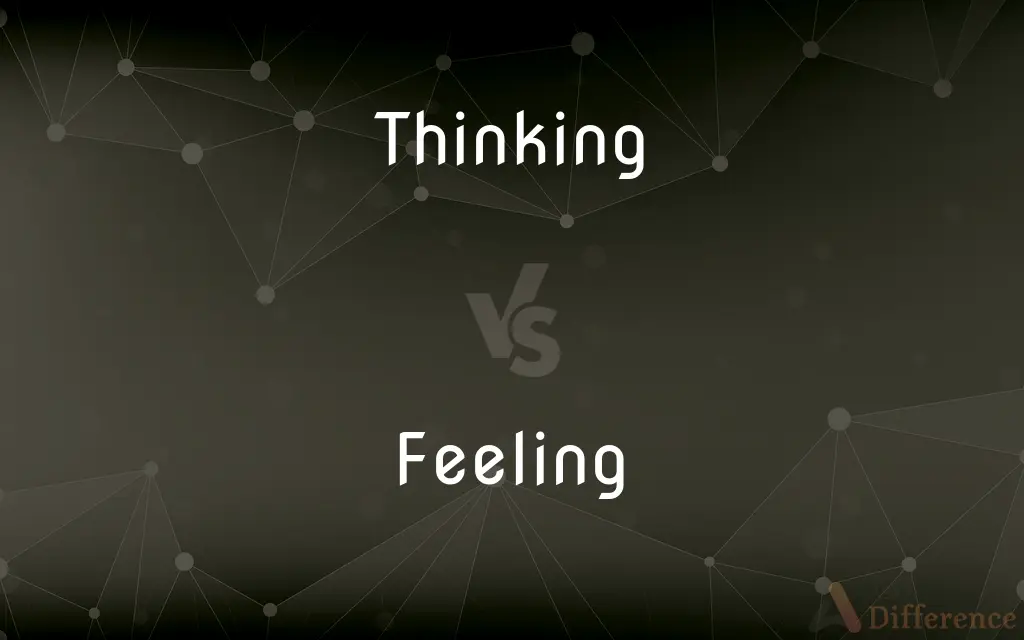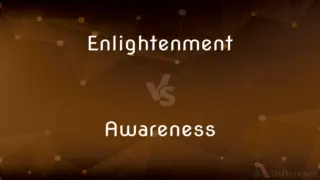Thinking vs. Feeling — What's the Difference?
Edited by Tayyaba Rehman — By Fiza Rafique — Published on October 3, 2023
Thinking involves logical reasoning and analysis, while Feeling pertains to emotions and subjective experiences.

Difference Between Thinking and Feeling
Table of Contents
ADVERTISEMENT
Key Differences
Thinking and Feeling are two fundamental aspects of human cognition and experience. Thinking generally refers to the process of using logic, analysis, and reason to form conclusions or make decisions. It's an objective approach where facts, data, and rationale take precedence. Feeling, on the other hand, involves our emotional responses, intuitions, and subjective experiences. It's less about logic and more about personal values and emotions.
In many contexts, Thinking is associated with the brain's cognitive functions. It's the act of pondering, assessing, and drawing conclusions based on available information. For instance, a mathematician uses thinking to solve a complex equation. Feeling, conversely, is tied to our heart or gut instincts. It represents our internal emotional state, ranging from happiness and love to sadness and anger. When someone says they have a "gut feeling," they're usually referring to an instinctual, emotional response.
Comparison Chart
Nature
Logical and analytical
Emotional and subjective
Associated With
Brain's cognitive functions
Heart or gut instincts
Role in Decision Making
Evaluates objective criteria
Gauges based on personal values
ADVERTISEMENT
Expression
"I think this is right."
"I feel this is right."
Outcome
Conclusion or decision
Emotional state or intuition
Compare with Definitions
Thinking
The use of reason and logic in problem-solving.
His strategic thinking saved the company from bankruptcy.
Feeling
An emotional state or reaction.
He had a feeling of joy after hearing the good news.
Thinking
A person's ideas or opinions.
We align with their way of thinking.
Feeling
Intuitive awareness or instinct.
She had a strong feeling that something was wrong.
Thinking
The process of forming thoughts.
Early morning is when my thinking is the clearest.
Feeling
Empathetic understanding or disposition.
He spoke with so much feeling and passion.
Thinking
Cognitive activity in the brain.
Constant thinking can lead to mental fatigue.
Feeling
Feeling was originally used to describe the physical sensation of touch through either experience or perception. The word is also used to describe other experiences, such as "a feeling of warmth" and of sentience in general.
Thinking
The process of considering or reasoning about something
The selectors have some thinking to do before the match
Feeling
An emotional state or reaction
A feeling of joy
Thinking
Using thought or rational judgement; intelligent
He seemed a thinking man
Feeling
An idea or belief, especially a vague or irrational one
He had the feeling that he was being watched
Thinking
The act or practice of one that thinks; thought.
Feeling
The capacity to experience the sense of touch
A loss of feeling in the hands
Thinking
A way of reasoning; judgment
To my thinking, this is not a good idea.
Feeling
A sensitivity to or intuitive understanding of
She says I have a feeling for medicine
Thinking
Characterized by thought or thoughtfulness; rational
We are thinking animals.
Feeling
Showing emotion or sensitivity
She was a feeling child
Thinking
Thought; gerund of think.
What is your thinking on this subject?
Feeling
The sense of touch
Lost feeling in a toe.
Thinking
Present participle of think
I'm thinking about inventing a new perpetual-motion machine.
Feeling
A sensation experienced through this sense
Enjoyed the feeling of rain on my face.
Thinking
Having the faculty of thought; cogitative; capable of a regular train of ideas; as, man is a thinking being.
Feeling
A physical sensation other than one experienced though touch
A feeling of warmth.
Thinking
The act of thinking; mode of thinking; imagination; cogitation; judgment.
I heard a bird so sing,Whose music, to my thinking, pleased the king.
Feeling
An emotion, such as joy or sorrow
A feeling of loss.
Thinking
The process of thinking (especially thinking carefully);
Thinking always made him frown
She paused for thought
Feeling
Strong mental agitation or excitement involving the emotions
Eyes that showed deep feeling.
Thinking
Endowed with the capacity to reason
Feeling
An emotion of affection; a fondness
Does she have feelings for you?.
Thinking
The act of considering or reflecting on something.
Her thinking on the subject has evolved over the years.
Feeling
The capacity to experience refined emotions; sensitivity; sensibility
A man of feeling.
Feeling
Feelings Susceptibility to emotional response; sensibilities
The child's feelings are easily hurt.
Feeling
An awareness or impression
He had the feeling that he was being followed.
Feeling
An opinion based strongly on emotion; sentiment
Voters' feelings on tax reform.
Feeling
A general impression conveyed by a person, place, or thing
This office has the feeling of a fortress.
Feeling
The emotions thought to be conveyed or intended by a work of art
The painting's feeling of anguish.
Feeling
Appreciative regard or understanding
Has no feeling for propriety.
Feeling
Intuitive awareness or aptitude; a feel
Has a feeling for language.
Feeling
Easily moved emotionally; sympathetic
A feeling heart.
Feeling
Expressive of sensibility or emotion
A feeling glance.
Feeling
Emotionally sensitive.
Despite the rough voice, the coach is surprisingly feeling.
Feeling
Expressive of great sensibility; attended by, or evincing, sensibility.
He made a feeling representation of his wrongs.
Feeling
Sensation, particularly through the skin.
The wool on my arm produced a strange feeling.
Feeling
Emotion; impression.
The house gave me a feeling of dread.
Feeling
Emotional state or well-being.
You really hurt my feelings when you said that.
Feeling
Emotional attraction or desire.
Many people still have feelings for their first love.
Feeling
Intuition.
He has no feeling for what he can say to somebody in such a fragile emotional condition.
I've got a funny feeling that this isn't going to work.
Feeling
An opinion, an attitude.
Feeling
Present participle of feel
Feeling
Possessing great sensibility; easily affected or moved; as, a feeling heart.
Feeling
Expressive of great sensibility; attended by, or evincing, sensibility; as, he made a feeling representation of his wrongs.
Feeling
The sense by which the mind, through certain nerves of the body, perceives external objects, or certain states of the body itself; that one of the five senses which resides in the general nerves of sensation distributed over the body, especially in its surface; the sense of touch; nervous sensibility to external objects.
Why was the sightTo such a tender ball as the eye confined, . . . And not, as feeling, through all parts diffused?
Feeling
An act or state of perception by the sense above described; an act of apprehending any object whatever; an act or state of apprehending the state of the soul itself; consciousness.
The apprehension of the goodGives but the greater feeling to the worse.
Feeling
The capacity of the soul for emotional states; a high degree of susceptibility to emotions or states of the sensibility not dependent on the body; as, a man of feeling; a man destitute of feeling.
Feeling
Any state or condition of emotion; the exercise of the capacity for emotion; any mental state whatever; as, a right or a wrong feeling in the heart; our angry or kindly feelings; a feeling of pride or of humility.
A fellow feeling makes one wondrous kind.
Tenderness for the feelings of others.
Feeling
That quality of a work of art which embodies the mental emotion of the artist, and is calculated to affect similarly the spectator.
Feeling
The experiencing of affective and emotional states;
She had a feeling of euphoria
He had terrible feelings of guilt
I disliked him and the feeling was mutual
Feeling
A vague idea in which some confidence is placed;
His impression of her was favorable
What are your feelings about the crisis?
It strengthened my belief in his sincerity
I had a feeling that she was lying
Feeling
The general atmosphere of a place or situation and the effect that it has on people;
The feel of the city excited him
A clergyman improved the tone of the meeting
It had the smell of treason
Feeling
A physical sensation that you experience;
He had a queasy feeling
I had a strange feeling in my leg
He lost all feeling in his arm
Feeling
The sensation produced by pressure receptors in the skin;
She likes the touch of silk on her skin
The surface had a greasy feeling
Feeling
An intuitive understanding of something;
He had a great feeling for music
Feeling
A belief not based on fact or evidence.
I have a feeling she will be late today.
Feeling
Physical sensation not connected to cognition.
There's a feeling of numbness in my leg.
Common Curiosities
How is feeling different from thinking?
Feeling pertains to emotions, intuitions, and subjective experiences, while thinking is logical and analytical.
Is thinking always objective?
While thinking aims to be objective through logic and reason, personal biases can sometimes influence it.
What does thinking generally involve?
Thinking involves using logic, analysis, and reason to form conclusions or make decisions.
How do thinking and feeling influence behavior?
Thinking guides systematic actions, while feeling influences behavior based on emotional states and values.
Can thinking and feeling coexist in decision-making?
Yes, many decisions involve both logical reasoning (thinking) and emotional considerations (feeling).
Are feelings always irrational?
No, feelings can be based on intuition and experiences, which might not be immediately rational but can still be valid.
Share Your Discovery

Previous Comparison
Enlightenment vs. Awareness
Next Comparison
Delay vs. StayAuthor Spotlight
Written by
Fiza RafiqueFiza Rafique is a skilled content writer at AskDifference.com, where she meticulously refines and enhances written pieces. Drawing from her vast editorial expertise, Fiza ensures clarity, accuracy, and precision in every article. Passionate about language, she continually seeks to elevate the quality of content for readers worldwide.
Edited by
Tayyaba RehmanTayyaba Rehman is a distinguished writer, currently serving as a primary contributor to askdifference.com. As a researcher in semantics and etymology, Tayyaba's passion for the complexity of languages and their distinctions has found a perfect home on the platform. Tayyaba delves into the intricacies of language, distinguishing between commonly confused words and phrases, thereby providing clarity for readers worldwide.













































